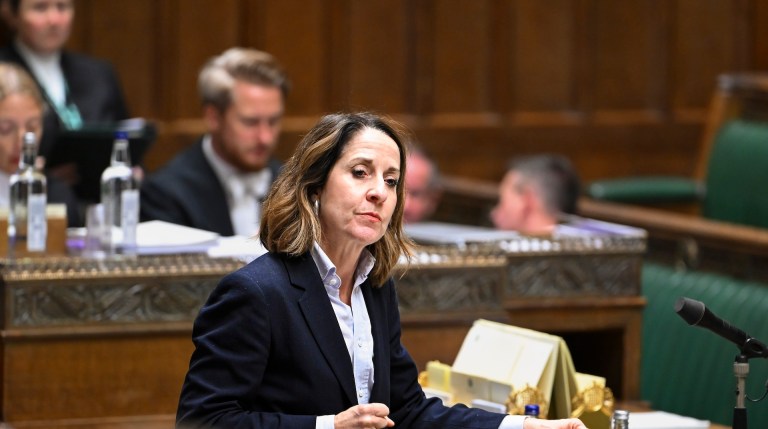Case numbers suffer. Wilsons has reduced numbers of cases by 47% since 2014. Duncan Lewis, one of the largest providers of asylum legal aid in the UK, previously opened 4,000 cases a year. Now they can cope with around 800. “Every case we lose a few hundred quid on. We lose a significant amount on every single case we take on,” said Jeremy Bloom, a solicitor in Duncan Lewis’s public law and immigration departments.
“Even though we see the need for it, and we want to be there for our clients, we just can’t do it on the scale we’ve done it previously.”
Duncan Lewis is turning away 80% of cases referred through NGOs. Stacey Edgar, the deputy CEO of South West London Law Centres, said the charity, which offers legal aid, has to turn away most of the 80-100 inquiries they get each month.
“This profession, working in immigration casework, especially with highly vulnerable people, has a really high rate of burnout, highly susceptible to vicarious trauma,” said Edgar.
“So our caseworkers have to be really careful not to overwork themselves. Not to expose themselves to that risk.”
Read more of the Big Issue’s investigation series into how the broken legal aid system harms asylum seekers:
Advertising helps fund Big Issue’s mission to end poverty
Firms struggle to manage as the crisis reaches boiling point
While rates have been frozen for almost 30 years, it was 2020 when Bloom noticed the situation getting “really bad”. Increasing numbers of asylum seekers didn’t have representation. Under financial pressure, his firm made the decision in 2022 to stop taking on nearly all new appeal work.
Matthew Davies spent 30 years working his way up at Wilsons, a firm dedicated to legal aid – unglamorous, difficult, badly-paid work. Now a partner, he still considers himself a legal aid lawyer. Yet he barely does any. His role now is to take on well-paid private work, which subsidises junior staff taking on legal aid work.
“Some of the best legal aid and asylum lawyers are pretty much doing private work,” he said. “That is a pity because if we were able to afford to do that work we could. We’d bring our expertise to it.”
This method does not always stem the bleeding. Junior staff, assigned to growing amounts of private work, realise they can make proper, lawyer money by going to work for a corporate firm.
‘We’re constantly carrying a lot of debt’
Two issues make life harder for lawyers who remain and delve into legal aid cases. Both concern getting paid, and both push firms away from the system.
To get paid an hourly rate, lawyers must go far beyond the hours covered by the initial fixed fee. If the time a lawyer spends falls between one and three times the limit, they’re not getting paid for the extra. The problem is, lawyers told the Big Issue, the government’s Legal Aid Agency will claw back every penny it can. “We’re audited up to the eyeballs,” said Edgar. “They will pick up each file and shake it for pennies and take it off you if they can find a reason to.”
Advertising helps fund Big Issue’s mission to end poverty
To compensate for this, Wilsons has a team of five staff dedicated to totting up the hours – something they don’t need for private cases. Davies found that staff scared of the audit, don’t record time they’re entitled to in the fear it will be clawed back, a shortfall amounting to around 5-10% of the extra money they’re entitled to. The impact on Edgar’s team is noticeable, she said: “If we didn’t have to justify ourselves to that extent, we could help more people, undoubtedly.”
Then there are “disbursements”. Cases may require expert reports, medical reports, psychiatric reports, translators, or interpreters. All these boost an asylum seeker’s chances of their case being understood and approved – for instance, medical evidence that they have been tortured. Lawyers pay for these, but do not get reimbursed until a claim is approved. This can often take years.
“We’re constantly carrying quite a lot of debt”, said Bloom, who estimated his firm had a few hundred thousand in outstanding disbursements at any one time. “It’s a big problem for us, but we can just about manage it. For outfits that are employing a couple of fee-earners I can totally see how that would be unsustainable even in the short-term.”
‘Not providing legal aid probably does cost the government more in the long run’
There are complaints that there is too much legal aid for asylum seekers. When The Sun revealed spending on legal aid for asylum cases totalled £13m in 2023, Tory MP Nigel Mills said money was being wasted on “spurious appeals and blatant delaying tactics”.
But those interviewed argued that the lack of funding is simply costing more down the line. With proper access to lawyers, Bloom argued, cases would progress smoothly with less likelihood of appeals being needed.
“It probably does cost the government more in the long run not providing decent access to legal aid at the very start of people’s cases,” said Bloom. “We see a lot of appeals where they don’t even need to be before the tribunal. If their case had been dealt with the first time round, they would have likely received a grant of leave or asylum straight off the bat.”
Advertising helps fund Big Issue’s mission to end poverty
Davies agreed, adding: “It is so much more efficient for everybody for someone to be legally represented, because the lawyers know how to present a case.”
“It’s one of those situations where it makes no financial sense, because it will just add costs down the line.”
In the meantime, every case which lingers on represents an asylum seeker stuck in Home Office-provided accommodation contributing to an annual bill of £3.1bn.
The lawyers taking the government to court in a bid for change
In June, Duncan Lewis took Alex Chalk, the then-Lord Chancellor to the high court, arguing he was failing in his responsibility to make legal aid available. In a summary of the case, the firm said the now-former Lord Chancellor’s position is that “there is sufficient capacity among providers to meet the current levels of demand.”
The Big Issue has learned the government is now set to announce by the end of November whether it will increase legal aid rates for asylum seekers, with the Lord Chancellor recognising the “urgency” of the issue following Duncan Lewis’s legal challenge.
Meanwhile, a review of civil legal aid is ongoing, but Bloom holds out little hope. “All the review is going to result in is yet another consultation process where everyone’s going to say the same things we’ve said for years and years,” he said.
Advertising helps fund Big Issue’s mission to end poverty
A government spokesperson said: “We are committed to ensuring legal advice is available to those who need it most. The Legal Aid Agency regularly monitors the level of support available, taking swift action wherever issues arise.”
Big Issue is demanding an end to extreme poverty. Will you ask your MP to join us?
Do you have a story to tell or opinions to share about this? Get in touch and tell us more. Big Issue exists to give homeless and marginalised people the opportunity to earn an income. To support our work buy a copy of the magazine or get the app from the App Store or Google Play.










